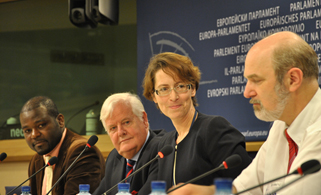Toma Magda, President of EA Croatia, and David Buntinx, President of EA Flanders, talk about the empowerment of young leaders and experiences gained in two different NEAs
Toma Magda is a fifty-nine-year-old, full-time pastor and director of Croatian Baptist Aid, a humanitarian agency working with refugees. For many years he has been a member of the Croatian Evangelical Alliance and volunteered to take over presidency a year and a half ago to lead the Alliance in a revitalization process. David Buntinx is co-founder of a Christian youth organization and worked many years as a youth work consultant and board member of the Confederation of Free Evangelical Churches in Belgium. At the age of thirty-seven, he started working as a president of the Flemish Evangelical Alliance in 2018. The EEA Communications Department met Toma and David for an interview, in which they describe the importance of the empowerment of youth in National Evangelical Alliances (NEAs), discuss actual steps and hindrances, and give recommendations from their experiences.
What made you realize the importance of the empowerment of young leaders in your Alliance? Why do you think it is crucial to involve youth?
David: I grew an awareness of the importance when I was coaching youth leaders. Many of the pastors and elders I met were quite old. But rather than needing to develop a vision for young leadership, I think we need to develop a vision for an intergenerational leadership. The different generations have different things to offer to each other. If we want to serve the whole evangelical community, then we need the different approaches and world views.
Toma: Don’t get me wrong, but the Alliance scene has become a bit of an Old Boy´s Club. Yes, we, as the older generation, have some experience, but experience is not enough. Young leaders are a necessity if we want to survive. The world and our context are changing so rapidly that even my thirty-year old daughter is having a problem understanding the eighteen-year-old kids nowadays. If we want to be relevant in society at all, we need to put people with at least half our age in charge and then serve and support them. If we are not relevant, we cannot fulfil our mission. Young people always bring new ideas, new thoughts and different perspectives to the table. They are risk-takers, like Gideon in the bible, who didn’t have a problem destroying the altar of Baal and the grove, while the wise men wanted to kill him for that matter. Young leaders encourage us to break out of our, sometimes dangerous, routine. And have a look at Paul and what he achieved through the involvement of the next generation in his work. Through his empowerment of young leaders, the church survived, developed and the world was evangelized.
How can young leaders be empowered? What actual steps are you undertaking in your Alliance in order to promote young leadership?
Toma: Firstly, we have to recognize young leaders and their potential. Additionally, we need to give them the space to express themselves and entrust them with practical responsibilities. Ask them about their opinion and their attitudes, and take them seriously! Empowering young leaders also requires us to provide the young generation with a safe environment and a platform where they have the freedom to make mistakes. Making mistakes is their way of learning and they need to feel our acceptance and our support, even if they fail. The Croatian Evangelical Alliance has had a leadership with a high average age for many years. When we faced a crisis during the last years, the only way forward, that I saw, required the involvement of the young generation. So, we started to invite young leaders we knew from different denominations and established a new leadership structure with eight senior and eight junior leaders. It first needed someone to push the endeavor and stretch the thinking of the established leadership, but even after period of seven months, everyone agrees that it was a great decision. We have been greatly enriched and encouraged through the involvement of the younger generation.
David: I consider it very important to provide the young generation with opportunities. In my case, I have to give great credit to the former president of our EA, who was eager to find a young successor, which is not quite unusual for many members of the Flemish Alliance. Furthermore, when you have somebody young on board, it is essential to have heart to heart conversations, where trust can be built and fresh ideas can be shared and worked out. From my experience, trust can also be built up by explaining the two generations to each other. And once you start this process, I think, it happens quite automatically that empowered, young leaders will invite other young people on board who have experience and fresh ideas that can help towards building up your Alliance. But in my opinion, it takes two to tango. We, as a younger generation, also need to respect senior leaders and value what they have accomplished and what they have been faithfully doing for so many years.
Which challenges do you see when handing over leadership? What hindrances are you experiencing within your Alliance in the process of empowerment?
Toma: Well, we only started the process seven months ago, but from my experience the older generation is in a state of “fatigue of material”. Our old way of thinking and some of our traditions need to be stretched until the finally break. In communism, our communities were small and persecuted, which is why Christians had to be very careful. In the 90s, my generation experienced a terrible war in Croatia and we all shared the same traumas and horrible experiences. Therefore, church leaders developed a certain kind of mistrust and a fear of letting things out of their control and opening up to uncertain situations. But this was 30 years ago,and things changed. So, we need to adapt our mentality, which oftentimes needs a push from the outside. We will not live forever. It’s time for us to open up and make space for the next generation.
What are the challenges young leaders are often confronted with?
David: In my opinion, the strength and the weakness of older leaders is their experience. If you have been doing things for so many years, you will have developed your ideas about what you think is right and wrong, and what will and will not work. Additionally, you might have also developed mistrust towards some ideas due to bad experiences. So, young leaders are oftentimes confronted with criticism and stringent approaches. This results in two challenges for the next generation. Firstly, it can be quite hard as a young leader to be given a chance to speak, to develop and to prove yourself. The other challenge is that an old leadership with stringent approaches and negative emotions is not really appealing to young leaders. They do not want to be part in something like this. So, I think we need people like Toma, who actually invite the young generation the table, listen to their ideas, let them work out those ideas and assure their support even if things go wrong; people who are willing to give up their power and control, who are flexible and who work towards the future.
What can the older generation do to support young leaders?
Toma: As David mentioned, the older generation sometimes highly contributes to the discouragement of young leaders, which results in a lack of motivation. But sometimes the younger generation is also lacking motivation, due to their focus on the experience of the moment. Both requires us to motivate younger people; to show them their potential and give them the chance to use it, or to wake them up and show them that there is more to life then the moment.
What are your goals for the future? How you would like to further strengthen the involvement of young leadership in your Alliance?
Toma: My overall goal for the Croatian Evangelical Alliance is that we are no longer a group that is united by a set of rules, but a group that is free and led by vision. I had enough rules in communism and I have had enough of the overemphasis of rules in our churches. I would like to see freedom and a vision that binds and keeps us together.
David: I really believe in the intergenerational approach. I would like us as an Alliance to establish some structures to have good intergenerational conversations about the topics that matter. When we have the right conversations with the right people, beautiful things can happen. There needs to be a culture where different generations complement each other in their work. I also agree with Toma, that the most important thing is the development of a vision. A vision needs to be believable, something that makes the younger generation excited to go with you, and I think it’s important that young and old develop this vision together.
What could a future relevant National Evangelical Alliance or European Evangelical Alliance look like?
David: My personal view is that we should do less things, but the right things. Our business is to connect people with the same mission and when they accomplish things together, then we’re being effective. As an Alliance, we are involved in so many things, but we are not reaching the society and are not speaking with one voice. In terms of the EEA, bringing the networks in the EEA closer together and helping them realize what they can mean to one another, would help them even more increase the things possible and we could be a real voice to our society.
Toma: David said something so important. We need to speak with one voice. If we succeed, by God’s grace, that Christians realize that it’s more important to stand together and have a common voice that reaches the community instead of having their own small kingdom, then we are on a good way. The world will recognize us by our unity and love for one another.












